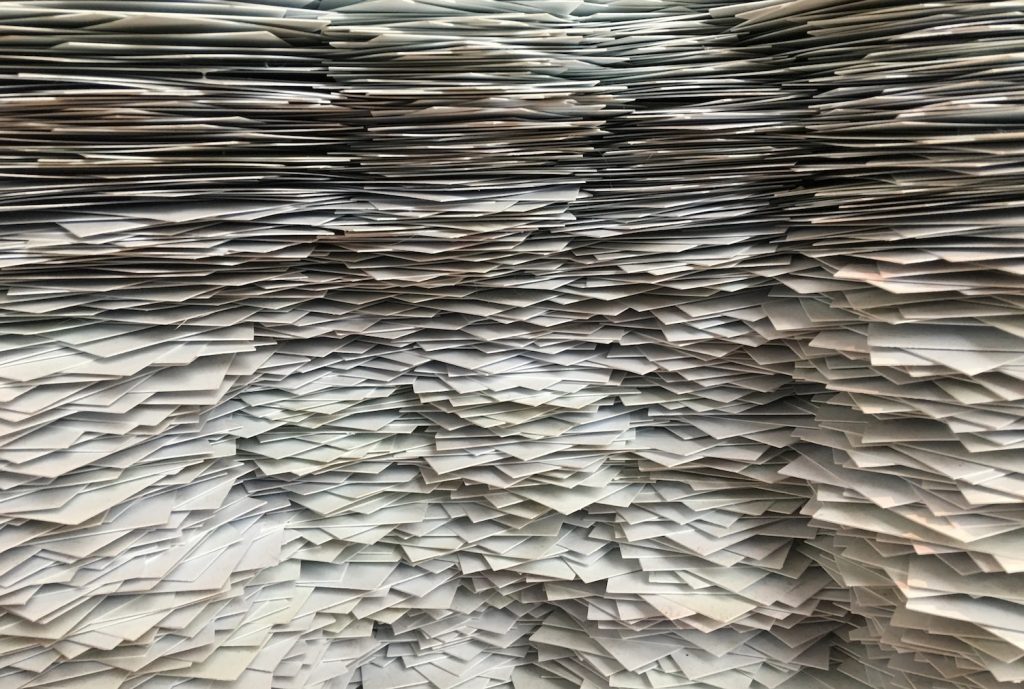I have too much stuff. That’s the bare truth.
Anxiety and guilt morph into a low-grade, psychic nausea, until I finally can’t take it anymore. Then I pay the best $89 of my life on the minimalist Joshua Becker’s course, “Uncluttered,” and I have my kitchen to show for it. It’s clear and clean and by far the most beautiful room in the house. But soon the momentum disappears, and I don’t know why. So I take a good look at what I’m thinking, and a pattern emerges. My life is in gridlock because of this pattern. The tyranny of What if I need this later paralyzes all forward movement.
As I work to unclutter my home, unconscious attachments come to light. For example, I have a Tricycle magazine collection going back ten years. These days everything’s online, so why do I still have these physical copies? Because what if the apocalypse comes and there’s no internet? Really? Sociopolitical upheaval has obliterated the grid and I’m going to be sitting on the couch reading a dharma magazine? Well, you could do worse, but in the daylight, this is just raw attachment. I’m just holding on to hold on.
I bought eye makeup that I don’t know how to apply, but it looked so awesome on the Instagram girl. I don’t wear eye makeup, but what if my novel gets published and I have to go to fancy events to promote it? This is embarrassing. I’m a reasonably intelligent woman, and facing these foibles is no fun.
My long time teacher, Anam Thubten, has always said that the experience of meditation is not floaty bliss. It’s mostly heartbreaking and sometimes hilarious. We have to witness all the ways in which we scramble for solid ground, where there’s no solid ground. We have to identify when and how and why we struggle against spaciousness and presence.
So, if I’m squirming on my cushion, then I’ve probably hit pay dirt. If I have the courage, I might go a little further. What are the less funny what ifs? What are the deeper anxieties that drive my day? Invariably, they’re about the (nonexistent) future. What if climate change eats my house? What if we never get on top of this virus? What if our country devolves into civil war because we actually, for real, can’t agree on what facts are?
If I hang out in the lobby of this terrible future long enough, I’ll end up living in its penthouse—with a stunning view, in every direction, of everything that could go wrong. Is that what I want?
If not, I have options. I don’t even have to go to that hotel, much less live there. My consciousness can be trained in other directions. Countless scientific studies have proven that we can create new neural pathways, enabling us to experience the exact same life in a completely different way. We can do this.
So the idea is, lose the what if. Be someone without a future.
Let’s take a deep breath and look at our lives. Look at maybe just our things, our furniture, our clothes, our memorabilia. Let’s examine the nature of our attachment to them. Why do we have these things? What do we really think would happen if we let them go? Without the future we’ve been living in, what can we let go of? Without the future we’re so attached to, what lets go of us?
When we experience this moment as though it were the only one we’ll ever have—when we really get that—a spaciousness opens up, breathing room, clarity, relief.
I have a shelf full of herbal ingredients that I’ve meant to learn about, so I can be my community’s makeshift medicine woman when the world ends. (It’s OK. You can laugh.) This is a fine aspiration, nothing wrong with it. But those ingredients have been there for many years. And I haven’t learned anything about herbs yet. I bought them and held on to them all that time because I was being driven by: What if the world ends and we can’t get medicine?
Enough already. The world is ending every day. It’s ending right now.
Using pretend solutions to solve imaginary tragedies is ridiculous. There are no guarantees we’ll make it to breakfast. It takes courage to see all that — to know that this is it, right here, and there’s nothing else. But when we do, then letting go of the Tricycle magazines, the eye makeup, the herbal tinctures, is not such a problem.
We can unclutter our lives. We can experience the blessing of a spacious now, right in the middle of our living rooms—rooms that feel ten times bigger now that we’ve let ourselves become the one in our family with “no future.”
Thank you for subscribing to Tricycle! As a nonprofit, we depend on readers like you to keep Buddhist teachings and practices widely available.
